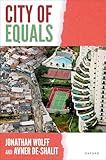City of equals / Jonathan Wolff, Avner de Shalit.
Publisher: New York : Oxford University Press, 2024Description: pages cmContent type:- text
- unmediated
- volume
- 9780198894735
| Item type | Current library | Status | Barcode | |
|---|---|---|---|---|
 Open Access Books - Publishers
Open Access Books - Publishers
|
National Law School | Available | OABP424 |
"When we think about equality in the city, we are very likely to think first of the wide and growing divide between rich and poor, in material terms. Yet when we think more about a 'city of equals' it becomes apparent that how people feel treated by the city and those around them, and whether they can live according to their values, are much more central. Accordingly, based on the authors' reflections, a multi-disciplinary literature review, and, distinctively, more than 180 interviews in 10 cities in 6 countries, the book offers an account of a city of equals based on the idea that it should give each of its city-zens a secure sense of place or belonging. Four underlying values structure this account. First, access to the goods and services of the city should not be based purely on the market. Second, each city-zen should be able to live a life they find meaningful. Third, there should be diversity and wide social mixing"-- Provided by publisher.
There are no comments on this title.
